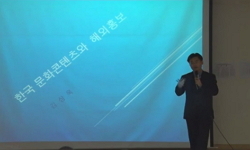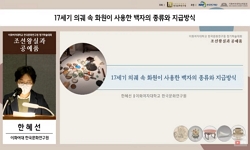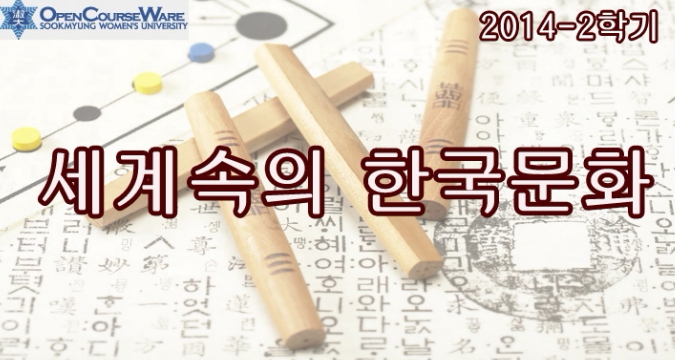In general, we are appreciating that the theme of work Samo-gok whould be missing of mother because which word could be translated as 'song of missing mother' and that the work could have been transmitted in the period of Goryeo(考慮) and Choseon(...
http://chineseinput.net/에서 pinyin(병음)방식으로 중국어를 변환할 수 있습니다.
변환된 중국어를 복사하여 사용하시면 됩니다.
- 中文 을 입력하시려면 zhongwen을 입력하시고 space를누르시면됩니다.
- 北京 을 입력하시려면 beijing을 입력하시고 space를 누르시면 됩니다.
鄕歌 전통에서 본 <思母曲>의 主題 = An Approach to the Theme of Samo-gok(思母曲)in the View Point of Tradition of Hyang-ga(鄕歌)
한글로보기부가정보
다국어 초록 (Multilingual Abstract)
In general, we are appreciating that the theme of work Samo-gok whould be missing of mother because which word could be translated as 'song of missing mother' and that the work could have been transmitted in the period of Goryeo(考慮) and Choseon(朝鮮) Dynasty because its theme was corresponding to their ethics. However the theme is more or less inconsonant with their confucian ethics, so I try to approach to the theme in the view point of tradition of Hyng-ga.
Especially I examined the meaning of Anmin-ga(安民歌), a work of Hyan-ga written and sung by Chungdam-sa(忠談師) in the period of Shilla(新羅) Dynasty and found that it was focused to that understanding and estimating vassal's authority highly could lead to making the relationship between king and vassals harmony and making the country world ruled by them peaceable and that the song Samo-gok would have accepted and transmitted by 'father' rulers not conflicting with their ethics. This conclusion maybe contribute to reading of contexts fo acception and transmission of the work further.
목차 (Table of Contents)
- 1. 서론
- 2. <思母曲> 텍스트의 분석과 해석의 방향
- 3. <安民歌>의 패러다임과 <사모곡>의 주제
- 4. 결론
- 1. 서론
- 2. <思母曲> 텍스트의 분석과 해석의 방향
- 3. <安民歌>의 패러다임과 <사모곡>의 주제
- 4. 결론
동일학술지(권/호) 다른 논문
-
- 釜山大學校 韓國民族文化硏究所
- 민혜진
- 2003
-
- 釜山大學校 韓國民族文化硏究所
- 조장연
- 2003
-
- 釜山大學校 韓國民族文化硏究所
- 송철호
- 2003
-
- 釜山大學校 韓國民族文化硏究所
- 조남욱
- 2003
분석정보
인용정보 인용지수 설명보기
학술지 이력
| 연월일 | 이력구분 | 이력상세 | 등재구분 |
|---|---|---|---|
| 2026 | 평가예정 | 재인증평가 신청대상 (재인증) | |
| 2020-01-01 | 평가 | 등재학술지 유지 (재인증) |  |
| 2017-01-01 | 평가 | 등재학술지 유지 (계속평가) |  |
| 2014-04-09 | 학술지명변경 | 외국어명 : 미등록 -> Journal of Koreanology |  |
| 2013-01-01 | 평가 | 등재학술지 유지 (등재유지) |  |
| 2010-01-01 | 평가 | 등재학술지 유지 (등재유지) |  |
| 2009-05-26 | 학회명변경 | 영문명 : Center for Korean Studies Pusan National University -> Korean Studies Institute, Pusan National University |  |
| 2007-01-01 | 평가 | 등재학술지 선정 (등재후보2차) |  |
| 2006-01-01 | 평가 | 등재후보 1차 PASS (등재후보1차) |  |
| 2004-01-01 | 평가 | 등재후보학술지 선정 (신규평가) |  |
학술지 인용정보
| 기준연도 | WOS-KCI 통합IF(2년) | KCIF(2년) | KCIF(3년) |
|---|---|---|---|
| 2016 | 0.91 | 0.91 | 0.82 |
| KCIF(4년) | KCIF(5년) | 중심성지수(3년) | 즉시성지수 |
| 0.83 | 0.83 | 1.368 | 0.28 |




 RISS
RISS DBpia
DBpia







